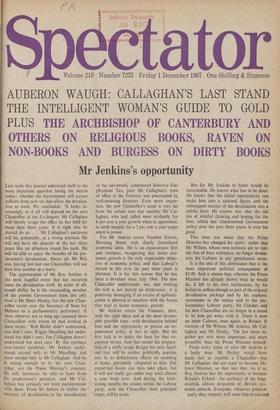Mr Jenkins's opportunity
Last week this journal addressed itself to the most important question facing the nation today: whether the Government will pursue policies from now on that allow the devalua- tion to work. We concluded: 'It looks in- creasingly as if all will depend on the next Chancellor of the Exchequer. Mr Callaghan will shortly resign the office he has held for more than three years. It is right that he should do so. . . . Mr Callaghan's successor will be, potentially, in a strong position. He will not have the disaster of the last three years like an albatross round his neck. He will be able to enjoy the benefits of his pre- decessor's devaluation. Above all, Mr Wil- son, having just lost one Chancellor, will not dare lose another in a hurry.'
The appointment of Mr Roy Jenkins is the most hopeful event that has occurred since the devaluation itself. In terms of all- round ability he is the outstanding member of the present Government team (his only rival is Mr Denis Healey, but the new Chan- cellor scores over the Secretary of State for Defence as a parliamentary performer). A close observer not so long ago assessed three Chancellors with whom he had worked in these terms: 'Rub Butler didn't understand, and didn't care; Reggie Maudling did under- stand but didn't care; Jim Callaghan doesn't understand but does care.' By this (perhaps over-harsh) yardstick, Mr Jenkins under- ' stands second only to Mr Maudling, and of the universally condemned Selective Em- ployment Tax, poor Mr Callaghan's term of office at the Treasury was punctuated by well-meaning disasters. Even more impor- tant, the new Chancellor's mind is very far from the tabula rasa that enabled Mr Cal- laghan, who had called most stridently for 6 per cent a year growth when in opposition, to settle happily for a 3 per cent a year target when in power.
For Mr Jenkins enters Number Eleven, Downing Street, with clearly formulated economic ideas. He is an expansionist first and foremost, recognising that faster eco- nomic growth is the only respectable objec- tive of economic policy, and that Labour's record in this over the past three years is abysmal. It is for this reason that he has been a devaluer since July 1966. The new Chancellor understands, too, that soaking the rich is not merely an irrelevance: it is positively damaging if an excess of egalitari- anism is allowed to interfere with the forces that lead to faster economic growth.
Mr Jenkins enters the Treasury, then, with the right ideas and at the most favour- able possible time—with devaluation behind him and the opportunity to pursue an ex- pansionist policy at last in sight. But his first task is to make the base for that ex- pansion secure, And that means the prepara- • tion of a really tough Budget for next April, one that will be neither politically popular nor, in its deflationary effects on spending at home, personally congenial to him. The export-led boom can then take place, but it will not really get under way until almost a year from now. And during the inter- vening months the strains within the Labour party, with the Chancellor their principal target, will be acute. But for Mr Jenkins to falter would be inexcusable. He knows what has to be done.
He knows that the initial unpopularity can make him into a national figure, and the subsequent success of the devaluation into a public hero. He knows, too, that the old era of wishful thinking and hoping for the best, which has characterised Government policy over the past three years, is over for good.
This does not mean that the Prime Minister has changed his spots: rather that Mr Wilson, whose own instincts are to take the line of least resistance, no longer domin- ates his Cabinet in any presidential sense. It is the end of this dominance that is the most important political consequence of $2.40. And it means that, whereas the Prime Minister has already shown what he would do, if left to his own inclinations, by his failure to deflate enough as part of the original devaluation package and by his euphoric statements to the nation and to the par-


































